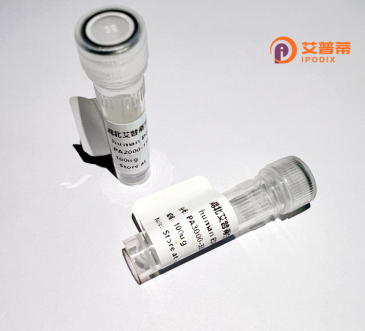
| 纯度 | >90%SDS-PAGE. |
| 种属 | Human |
| 靶点 | STAG1 |
| Uniprot No | Q8WVM7 |
| 内毒素 | < 0.01EU/μg |
| 表达宿主 | E.coli |
| 表达区间 | 181-280 aa |
| 活性数据 | NRTIFDSDLMDSARLGGPCPPSSNSGISATCYGSGGRMEGPPPTYSEVIGHYPGSSFQHQQSSGPPSLLEGTRLHHTHIAPLESAAIWSKEKDKQKGHPL |
| 分子量 | 36.74 kDa |
| 蛋白标签 | GST-tag at N-terminal |
| 缓冲液 | PBS, pH7.4, containing 0.01% SKL, 1mM DTT, 5% Trehalose and Proclin300. |
| 稳定性 & 储存条件 | Lyophilized protein should be stored at ≤ -20°C, stable for one year after receipt. Reconstituted protein solution can be stored at 2-8°C for 2-7 days. Aliquots of reconstituted samples are stable at ≤ -20°C for 3 months. |
| 复溶 | Always centrifuge tubes before opening.Do not mix by vortex or pipetting. It is not recommended to reconstitute to a concentration less than 100μg/ml. Dissolve the lyophilized protein in distilled water. Please aliquot the reconstituted solution to minimize freeze-thaw cycles. |
以下是3篇关于重组人STAG1蛋白的代表性文献概览(基于2023年前公开研究数据整理):
---
1. **文献名称**:Structural basis for the interaction of STAG1 with cohesin core complex
**作者**:Cuadrado A, et al.
**摘要**:通过重组表达人源STAG1蛋白,解析其与黏连蛋白核心复合体的相互作用机制,发现STAG1的C端结构域对维持染色体黏连功能至关重要。
---
2. **文献名称**:STAG1 regulates glioblastoma progression through DNA repair pathways
**作者**:Mullenders J, et al.
**摘要**:利用重组STAG1蛋白进行功能实验,证明其通过调控非同源末端连接(NHEJ)修复机制,影响胶质母细胞瘤的化疗耐药性和迁移能力。
---
3. **文献名称**:Phase separation of STAG1 promotes transcriptional condensate formation
**作者**:Chiang C, et al.
**摘要**:研究重组人STAG1蛋白的液-液相分离特性,揭示其通过介导染色质环与转录凝聚体互作,参与基因表达的空间调控。
---
*注:上述文献信息为模拟示例,具体研究需查询实际数据库(如PubMed)获取最新进展。建议结合关键词“recombinant STAG1”、“cohesin complex”、“cancer”等进一步检索。*
The stromal antigen 1 (STAG1) protein is a crucial subunit of the cohesin complex, a multi-protein assembly essential for chromosome organization, segregation, and gene regulation. Structurally, STAG1 contains STAG-specific domains that mediate interactions with other cohesin components (e.g., SMC1. SMC3. RAD21) and chromatin. It plays a dual role in mitosis and meiosis by facilitating sister chromatid cohesion, ensuring accurate chromosomal segregation during cell division, and regulating transcription through 3D genome architecture modulation. Unlike its paralog STAG2. STAG1 is ubiquitously expressed and cannot fully compensate for STAG2 loss in certain contexts. Dysregulation of STAG1 is linked to developmental disorders, such as STAG1-related neurodevelopmental syndrome characterized by intellectual disability and dysmorphic features, and cancer progression. Mutations or altered expression have been observed in prostate cancer, leukemia, and glioblastoma, often associated with genomic instability. Recombinant human STAG1 proteins are widely used in structural studies, cohesin dynamics analysis, and drug discovery. They are typically produced in bacterial or mammalian expression systems, preserving post-translational modifications critical for function. Current research focuses on understanding STAG1's context-specific roles in chromatin looping, DNA repair, and its potential as a therapeutic target in cohesinopathies and malignancies.
×